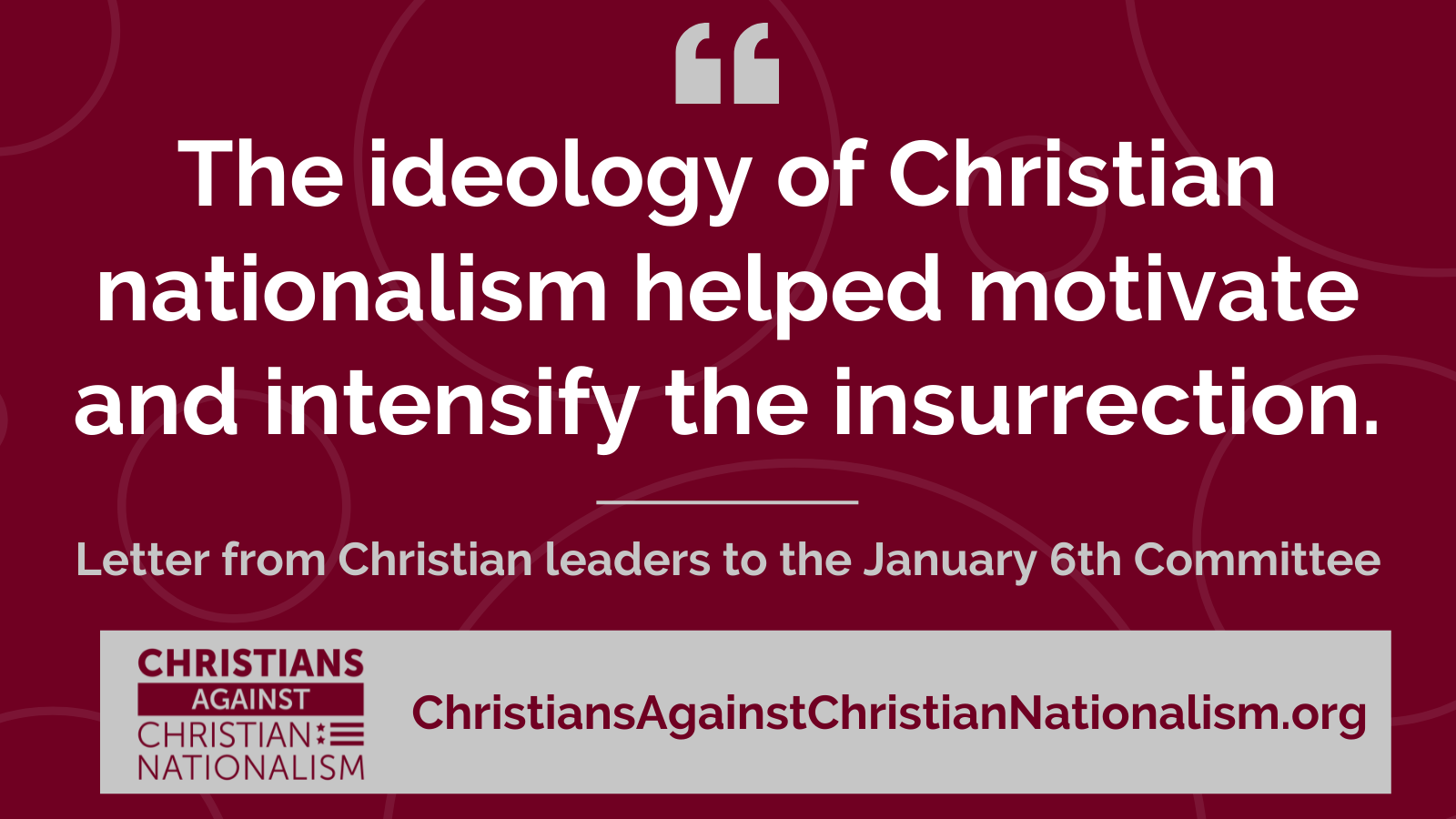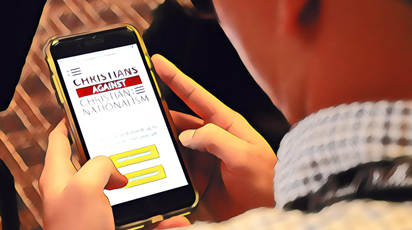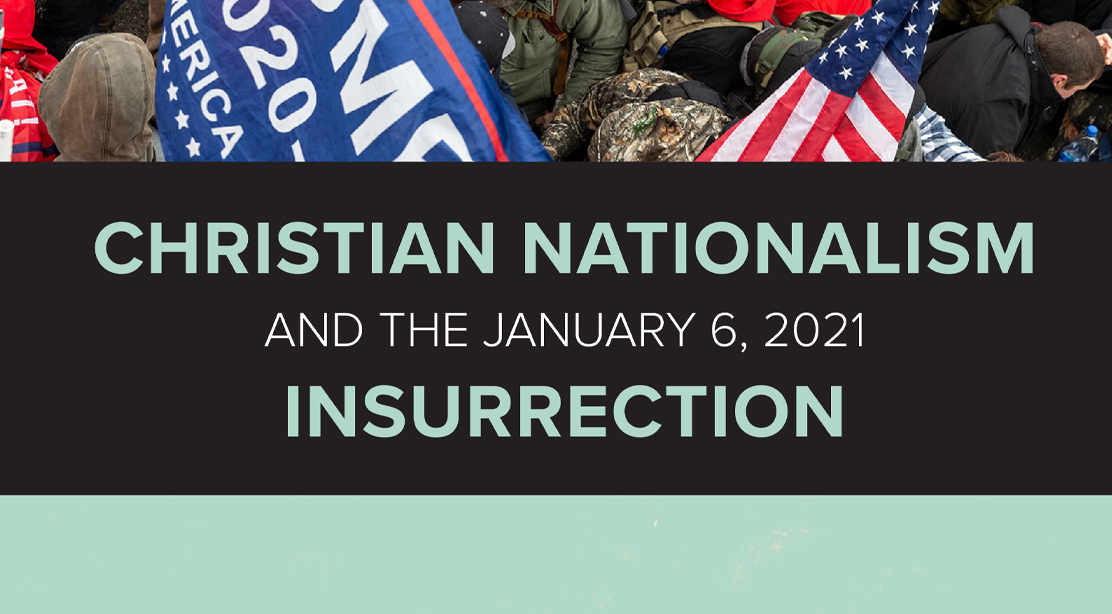Statement of Christian leaders to January 6th committee
Coordinators of the Christians Against Christian Nationalism initiative ask the Select Committee to investigate how Christian nationalism helped motivate and intensify the January 6 attack.

The following is the text of a letter sent June 2, 2022, to the Select Committee to Investigate the January 6th Attack on the United States Capitol from several Christian leaders.
For additional information and media requests, please contact Guthrie Graves-Fitzsimmons at [email protected].
Chairman Bennie Thompson
Select Committee to Investigate the January 6 Attack on the United States Capitol
U.S. House of Representatives
Washington, DC 20515
Dear Chairman Thompson and Members of the Select Committee:
As Christian leaders who coordinate the Christians Against Christian Nationalism initiative, we submit this statement for the record for the upcoming hearings of the Select Committee to Investigate the January 6 Attack on the United States Capitol. The ideology of Christian nationalism helped motivate and intensify the insurrection. We ask the Committee to thoroughly investigate the role that Christian nationalism played in the attack. This investigation into Christian nationalism is important so that history does not repeat itself and so that we understand this threat to our country’s historic commitment to religious liberty and the importance of defeating it.
Christians Against Christian Nationalism is a grassroots campaign of individual Christians from across the theological, ideological, denominational and political spectrum. To date, approximately 25,000 Christians have joined the campaign to call out the dangers of Christian nationalism. An additional 11,000 people of faith have signed a second statement from our partners at Faithful America and Faith in Public Life Action specifically to this committee, denouncing Christian nationalism’s role in the January 6 attack and asking you to take appropriate action. While the signers differ in many respects on theological and policy issues, we are united in our public stand against Christian nationalism.
Launched in July 2019, the website ChristiansAgainstChristianNationalism.org includes a statement of unifying principles that people who identify as Christian are invited to sign, a list of signatories organized by state, and a library of free resources, including fact sheets, webinars, a podcast series, articles and discussion guides for anyone to use. In the wake of the January 6 attack, Christians Against Christian Nationalism produced additional programming and resources for individuals, congregations, and other groups to confront Christian nationalism in their own communities.
Christian nationalism is a political ideology and cultural framework that merges American and Christian identities. Christian nationalism wrongly suggests that to be a “true” American one must be Christian, and that “real” Christians affirm certain positions in American political debates. Christian nationalism relies heavily on a false assertion that the United States was founded as a “Christian nation.” While it’s true that the majority of Americans identify as Christians, Christian nationalism is built on a mythology that the United States was founded by Christians in order to privilege Christianity. An accurate understanding of history teaches that the opposite is true: Religious freedom was a founding principle of our nation. But the mythology of a “Christian nation” is powerful nonetheless.
Christian nationalism is a political ideology, not a religion, and therefore it is not the same as Christianity. The ideology, however, misappropriates Christian symbols and Christian language, including crosses, the Christian flag, prayer and Bible verses.
The term “white Christian nationalism” acknowledges that Christian nationalism often overlaps with and provides cover for white supremacy and racial subjugation. The “Christian” in Christian nationalism is not necessarily tied to religious belief; instead, the term carries with it a host of assumptions of ethno-national identity inherent in the history of the United States, including who has historically held power in both religious organizations and in the government.
Though Christianity is not the same as Christian nationalism, the latter has so infected many Christian communities that it can be difficult to extricate Christianity from it. But to call out and criticize Christian nationalism is not anti-Christian. Indeed, it is our commitment to Christian values that leads us to work to dismantle Christian nationalism.
Because we had been raising awareness about Christian nationalism for approximately 18 months at the time of the January 6 attack, we quickly recognized the presence of Christian nationalism at the Capitol on that fateful day when we saw violent attackers brandish the symbols and language of Christianity.
Just three weeks after the attack, we organized an online event with religious leaders to discuss Christian nationalism and its ties to January 6. More than 1,000 people attended this event live and thousands more have watched the recording since.
Baptist Joint Committee for Religious Liberty (BJC), the host and organizer of Christians Against Christian Nationalism, also co-produced a report with the Freedom From Religion Foundation titled “Christian Nationalism and the January 6, 2021, Insurrection” that includes the most comprehensive accounting to date of the presence of Christian nationalism on January 6 itself, as well as at the events and rallies in the days and weeks before the attack. The extensive report looks at the history of Christian nationalism and its network leading up to January 6 as well as on the day itself. Two sections (Section V and Section VI) are extensively documented with links to videos and images showing just how the political ideology of Christian nationalism motivated and validated the attack for many, including in events preceding January 6. Examples include language at political rallies conflating religious and political authority, the writing of religious phrases on gallows, and the attackers leading a prayer in the Senate chamber. We include a copy of the report here as part of our submission.
As Christian leaders who are deeply concerned about Christian nationalism and its danger not only to our constitutional democracy but in its distortion of Christianity, we urge you to focus questioning and discussion on Christian nationalism and the role it played in bolstering, justifying and intensifying the January 6 attack. We saw how the attackers used Christian language and the name of Jesus to try to cloak their indefensible actions as religiously inspired or directed. Tragically, January 6 is just one example of how Christian nationalism in the hands of violent extremists can turn deadly.
Christian nationalism also directly challenges the promise of religious freedom for all, which is enshrined in our Constitution and the First Amendment. The centerpiece of the Christians Against Christian Nationalism campaign is a statement of unifying principles that restates these promises. We have included some of the most relevant principles here, alongside further elaboration.
- “People of all faiths and none have the right and responsibility to engage constructively in the public square.” Calling out Christian nationalism is not about banishing religion or religious people from the public square. Instead, we believe that everyone in our society has an equal right to speak and protest, when done peaceably and lawfully. Constructive engagement also means speaking truthfully. As Christian leaders, we are particularly troubled by other Christians who continue to repeat lies that the 2020 election was stolen. These falsehoods, especially when coupled with Christian nationalist messages that God preordained an election win for former President Donald Trump, have proven to be dangerous in mobilizing a violent force against our democracy.
- “Patriotism does not require us to minimize our religious convictions.” “Patriotism” is love of country that is expressed in a number of different ways, like waving the American flag, voting, enrolling for military service and protesting. “Nationalism” is allegiance to one’s country above all else, including one’s religious convictions. Christian nationalism is not patriotism and should not be confused with it.
- “One’s religious affiliation, or lack thereof, should be irrelevant to one’s standing in the civic community.” The only time “religion” or “religious” is mentioned in the U.S. Constitution is in Article VI and its prohibition of religious tests for public office. This foundational protection means that belonging in American government and society is not premised on religious identity or belief. Christian nationalism directly challenges this principle by suggesting that only Christians can be “true” Americans.
- “Government should not prefer one religion over another or religion over nonreligion.” Religious freedom is guaranteed by the religion clauses in the First Amendment: “Congress shall make no law respecting an establishment of religion, or prohibiting the free exercise thereof … .” The “no establishment” and “free exercise” clauses work together to protect every American’s religious freedom by ensuring that the government stays neutral when it comes to religion and religious matters. Christian nationalism threatens this principle when it argues that our country’s laws and policies should reflect Christian values.
- “Conflating religious authority with political authority is idolatrous and often leads to oppression of minority and other marginalized groups as well as the spiritual impoverishment of religion.” As Christians, we are commanded to love God and to love our neighbor. Those commandments come from Jesus, who also commanded us to render under Caesar what is Caesar’s and unto God what is God’s. That instruction recognizes that we are tasked with living in two realms simultaneously – God’s and earthly – and urges us not to confuse our allegiances. Christian nationalism merges Christian and American citizenship in ways that are directly at odds with the Gospel.
- “We must stand up to and speak out against Christian nationalism, especially when it inspires acts of violence and intimidation – including vandalism, bomb threats, arson, hate crimes, and attacks on houses of worship – against religious communities at home and abroad.” We condemn all acts of violence, and particularly those that have been inspired by Christian nationalism. The deadly attack of January 6 is sadly just one of many violent expressions of Christian nationalism, including the attacks on Mother Emanuel AME Church in Charleston, the Tree of Life Synagogue in Pittsburgh and the Tops Supermarket in Buffalo.Christian nationalism was an important contributing and unifying factor for the January 6 insurrectionists, and it remains a powerful ideology that continues to motivate and activate those who would threaten our democracy and seek to overthrow future election results. We thank you for your service on the select committee and ask that you discuss Christian nationalism and its role in the insurrection at the upcoming hearings. Please contact us if we may be of further service to your work.
Sincerely,
Amanda Tyler
Executive Director, Baptist Joint Committee for Religious Liberty (BJC) Lead Organizer, Christians Against Christian Nationalism
Rev. Dr. Paul Baxley
Executive Coordinator, Cooperative Baptist Fellowship
Rev. Jennifer Butler
Founder in Residence, Faith in Public Life
Dr. Anthea Butler
Geraldine R. Segal Professor in American Social Thought and Chair of Religious Studies, University of Pennsylvania
Shane Claiborne
President, Red Letter Christians
The Most Reverend Michael B. Curry
Presiding Bishop and Primate, The Episcopal Church
Rev. Dr. John C. Dorhauer
General Minister and President, United Church of Christ
The Rev. Elizabeth A. Eaton
Presiding Bishop, Evangelical Lutheran Church in America
The Rev. Nathan S. Empsall Executive Director, Faithful America
Dr. Jeffrey Haggray
Executive Director, American Baptist Home Mission Societies, Judson Press
Rev. Jimmie R. Hawkins
Director of Presbyterian Church (USA) Advocacy Offices:
Washington Office of Public Witness & Presbyterian Ministry at the United Nations Public Witness & Advocacy
Bridget Moix
General Secretary, Friends Committee on National Legislation
Mary J. Novak
Executive Director, NETWORK Lobby for Catholic Social Justice
Pastor Doug Pagitt
Executive Director, Vote Common Good
Rev. David Peoples
President, Progressive National Baptist Convention
Jesse Rincones, J.D.
Executive Director, Convención Bautista Hispana de Texas (Hispanic Baptist Convention of Texas)
Rev. Adam Russell Taylor President, Sojourners
Jemar Tisby, Ph.D. Historian and Author
Bishop Vashti Murphy McKenzie
“Interim President and General Secretary National Council of the Churches of Christ in the USA
Rev. Samuel C. Tolbert, Jr.
President, The National Baptist Convention of America International, Inc.
Rev. Jim Wallis
Chair in Faith and Justice, McCourt School of Public Policy
Director, Center on Faith and Justice Georgetown University






